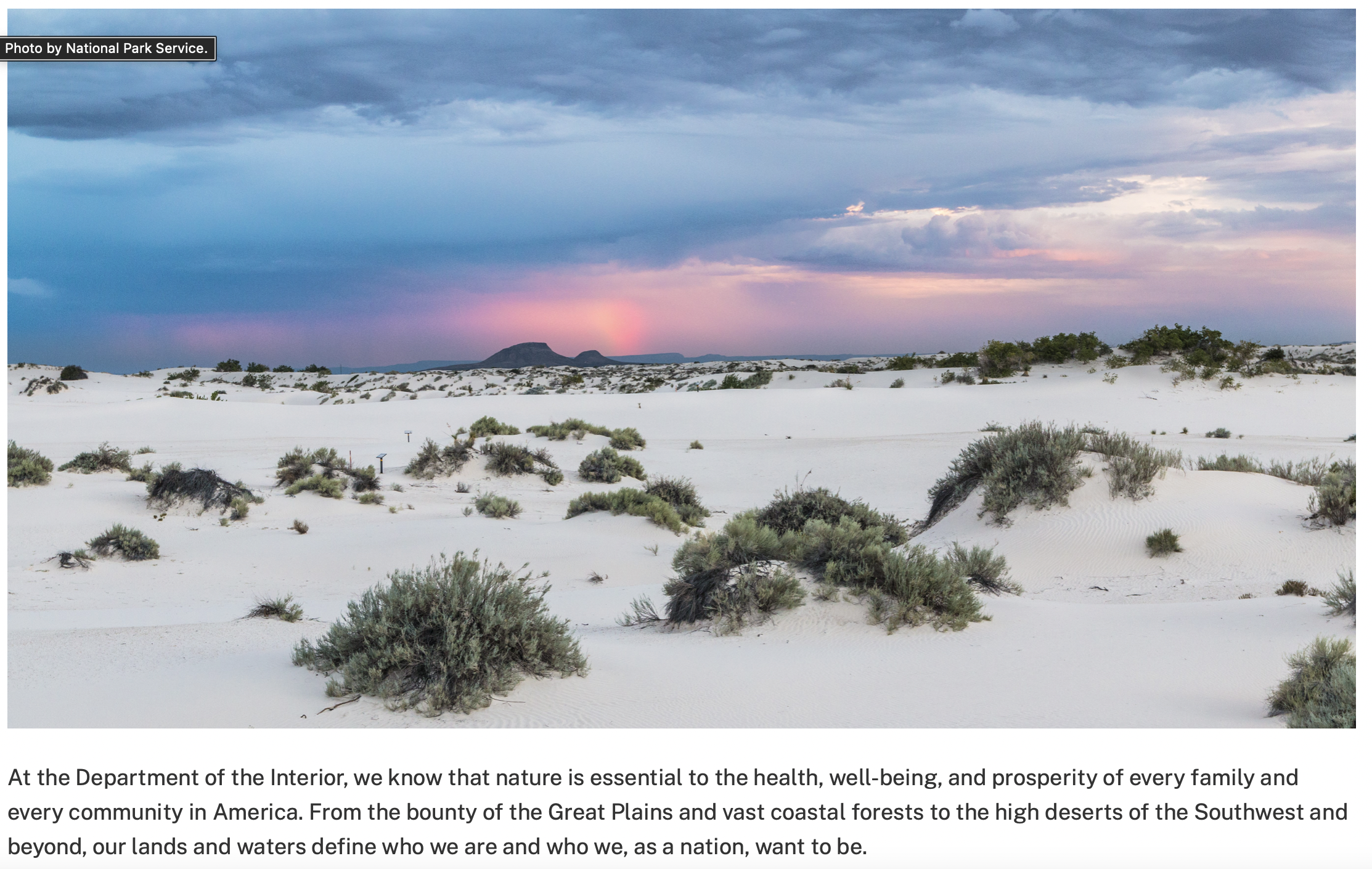
- Details
- By Jenna Kunze
The Department of the Interior (DOI) wants to advance equity in the outdoors. Although people of color make up nearly 40 percent of the total U.S. population, close to 70 percent of people who visit national forests, national wildlife refuges, and national parks are white, according to statistics collected from the U.S. Forest Service, National Park Service, and Fish and Wildlife Service.
On Monday, DOI announced plans to hold five listening sessions from Oct. 19 to Oct. 27 to hear public comment “on barriers that underserved communities and individuals may face in participating in recreation opportunities on Interior-managed public lands and waters.”
Want more Native News? Get the free daily newsletter today.
The testimony collected at the listening sessions is aimed at informing DOI’s work “to conserve at least 30 percent of America’s lands and waters by 2030,” all while achieving equitable access for all Americans to access them. DOI did not respond to requests from Native News Online to define “lands and waters," nor did it provide further details about where, or what, “30 percent” of lands and waters the plan encompasses.
“I believe that more people will truly care about our land, air, waters, animals, and outdoor places if they can experience them first hand. It's up to all of us to make sure that happens in communities across the country,” Secretary of the Interior Deb Haaland (Laguna Pueblo) said in a statement. “As we work to address inequitable access to the outdoors for communities of color and underserved communities, conversations and listening sessions like these will be crucial as we pursue the creation and stewardship of inclusive spaces that all people can access.”
DOI invites stakeholders to weigh in on: barriers they face visiting Interior-managed public lands and waters, and how those barriers can best be eliminated, as well as how the Interior can engage stakeholders from underserved communities.
CEO Sherry L. Rupert (Paiute/Washoe) of the American Indian Alaska Native Tourism Association (AIANTA)—a nonprofit working for the last two decades to support and grow Indigneous tourism— said that AIANTA hopes the listening sessions will also serve as a reminder that most of America’s public lands are the ancestral home to the country’s many Indigenous peoples.
“We encourage tribes to attend these listening sessions to remind Interior that visiting the ancestral homes of the nation’s native people can help alleviate the burden of over tourism at these sites,” Rupert said in a statement to Native News Online. “Sharing the wealth of Native experiences located in nearby gateway communities can help relieve some of the stresses of tourism at these park sites while also driving economic opportunities for nearby communities.”
AIANTA currently manages two partnerships with the National Park Service, and is helping chronicle the Native tourism experiences along the Juan Bautista de Anza National Historic Trail and the Anza National Historic Trail, both in San Benito County, California.
To join in on the Interior’s listening sessions, information is listed in the Federal Register notice. Advanced registration for individuals and groups is strongly encouraged, the Department notes. Stakeholders can also submit comments by visiting Regulations.gov and entering DOI-2021-0008 in the search bar to find the docket.
More Stories Like This
Gwich'in Tribal Governments Submit Comments Challenging Fish and Wildlife Service's Inadequate Environmental Review of Arctic Refuge Snow RoadRappahannock Tribe Challenges 9M-Gallon Water Plan
Feds release draft long-term plans for Colorado River management
Apache Leader Walks 60 Miles to Court Hearing That Will Decide Fate of Sacred Oak Flat
Rappahannock Tribe Raises Sovereignty and Environmental Concerns Over Caroline County Water Permit
Help us defend tribal sovereignty.
At Native News Online, our mission is rooted in telling the stories that strengthen sovereignty and uplift Indigenous voices — not just at year’s end, but every single day.
Because of your generosity last year, we were able to keep our reporters on the ground in tribal communities, at national gatherings and in the halls of Congress — covering the issues that matter most to Indian Country: sovereignty, culture, education, health and economic opportunity.
That support sustained us through a tough year in 2025. Now, as we look to the year ahead, we need your help right now to ensure warrior journalism remains strong — reporting that defends tribal sovereignty, amplifies Native truth, and holds power accountable.
 The stakes couldn't be higher. Your support keeps Native voices heard, Native stories told and Native sovereignty defended.
The stakes couldn't be higher. Your support keeps Native voices heard, Native stories told and Native sovereignty defended.
Stand with Warrior Journalism today.
Levi Rickert (Potawatomi), Editor & Publisher

